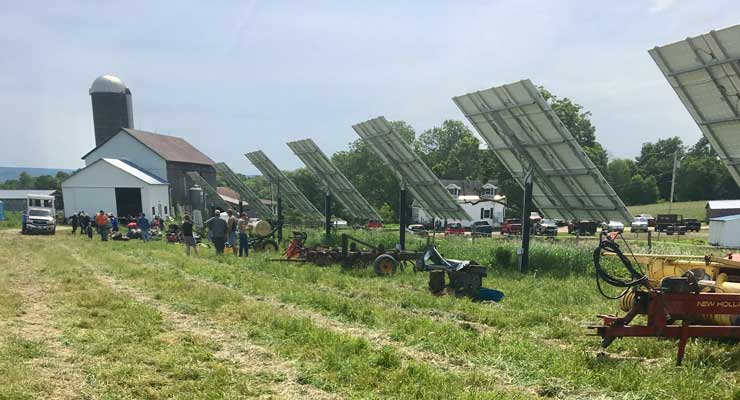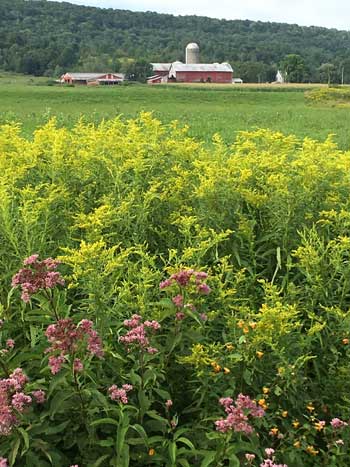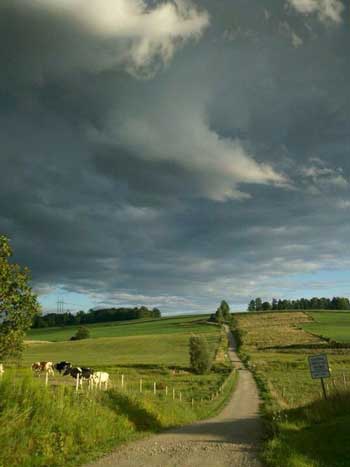
We put food on your table and are never invited to sit at the table. Big money in politics means government decisions about America’s food supply serve only industrial agriculture. The voices of family-owned farming, ranching and fishing operations are ignored, silenced and misunderstood.
Our rural and small-town economies are failing while the ultra-rich, big business and international investors steal America’s land, water and natural resources. The results are mass marketing of poor-quality food, the contamination of water and soil, and toxic chemicals overburdening the bodies of our families and children. This food crisis contributes to hunger, malnutrition and all the health problems that accompany poor quality food. We know the difference, do you?
 Dairy farming is the perfect microcosm for all the ways big money and bad policy is destroying local control of our food supply, devastating rural economies and filling us up with chemically enhanced products. Three trends stand out:
Dairy farming is the perfect microcosm for all the ways big money and bad policy is destroying local control of our food supply, devastating rural economies and filling us up with chemically enhanced products. Three trends stand out:
1) Industrial Farming Versus Family Farmers
Consumers and mainstream media confuse family-owned food producers with agribusiness and mega-food factories. You misunderstand the difference between the 82 pasture-raised dairy cows we know and raised versus the factory sheds that lock in 20,000 cows whose illnesses and cruel deaths are simply tax deductions that enhance profits. Industrial agriculture contaminates our water, poisons our land, treats livestock cruelly and delivers to you over-processed and adulterated food.
Family farmers respect our land, water, animals and shared natural environment.
We know how crop rotation strategies and grass-fed, pasture-raised cows revitalize the soil, capture carbon and produce the highest quality food. We know what is healthy, sustainable and environmentally friendly. We know we contribute to our local economies; we are economically responsible. We are part of the connections that make our rural communities whole and indeed strengthen the connections between rural and urban America. We want to be part of the solution for a wide variety of problems from water contamination to climate change. We want you to hear our voices.
2) Government Policies Created our Dairy Crisis
Federal and state policies created the dairy farming crisis and not a single politician of any party has demonstrated the courage to confront the full range of corruption in agriculture and challenge the systemic ignorance in government agriculture policies. No politicians have called for legislative hearings on a fair price for farm milk or a supply management system or how the family farmer and our rural economics lose out to the political influences of industrial farming, ranching and fishing. We are losing control of our local food supply and driving traditional farmers bankrupt.
The primary reason dairy farming is in crisis is that the government formula for the price of milk is far below the cost of production. For decades, Arden Tewskbury, General Manager of the Progressive Agriculture Organization (Pro Ag), has tracked prices paid for farm milk and the cost of production for the dairy product itself. He notes:
Our figures show the average national current cost to produce 100 pounds of milk (hundredweight) is $21.59. In 2013, the federal government set the second-highest price paid to farmers at $20.00 per hundredweight, the same year feed reached the second highest cost per hundred pounds on record ($11.47).
After costs for feed and delivery, farmers are assessed charges by states, localities, co-ops and processors that range from $3.50 to $11.50 per hundredweight in arbitrary, discriminatory and mandated decisions. These fees are deducted or assessed even after milk leaves the farm. The family farmer can never catch up.
Given the USDA national average cost of $21.59 per hundredweight, the shocking reality for dairy farmers, including in Pennsylvania and New York, is a “milk check” paid more in the $14 per hundredweight range, not anywhere near the $21.59 cost of production. No wonder farmers are going bankrupt, becoming clinically depressed and committing suicide.
 Monthly, the federal U.S. Department of Agriculture (USDA) sets the price paid to dairy farmers for fluid milk with a formula that does not include the farmer’s costs for feed, veterinarians, electricity, insurance, equipment purchase or repair and so on. On top of a federal formula that underpays dairy farmers, milk processors and co-ops take deductions for advertising, transportation and other charges including “market adjustment fees” that all together appear to intentionally drive small farmers out of business.
Monthly, the federal U.S. Department of Agriculture (USDA) sets the price paid to dairy farmers for fluid milk with a formula that does not include the farmer’s costs for feed, veterinarians, electricity, insurance, equipment purchase or repair and so on. On top of a federal formula that underpays dairy farmers, milk processors and co-ops take deductions for advertising, transportation and other charges including “market adjustment fees” that all together appear to intentionally drive small farmers out of business.
This is like asking someone to paint your house and submit a bill that does not include the costs of paint, transportation, ladders, brushes and helpers. That is not fairness. It is profit over people, animals, land and water.
Dairy farmers face bankruptcy when our government controls milk prices that do not adequately take into account the true cost of production. To make matters worse, government policies restrict community banks from lending or refinancing farm debt even though land and livestock are valuable assets. The view of Brenda Cochran, President of Farm Women United, is stark:
No farmer I know can get loans or refinance farm debt. The Dodd-Frank legislation, while protecting consumers from large bank exploitation, also restricts community banks from refinancing farm debt. The detailed regulations and oversight demands prevent community banks from truly helping farmers and rural businesses.
No agency is helping us survive the economic tsunami of bad policy, seasonal variations in farming prices and changing consumer tastes. We cannot meet onerous bureaucratic requirements. When we go bankrupt, our rural economies tank and ultimately America loses local control of our food supply as international corporations and hedge fund investors buy up our land and steal our natural resources.
Food production regulations favor industrial-sized agriculture over small, family owned farms. Environmental and work safety standards are rarely enforced for the largest farms. Rules for organic farming and ranching are excessive, expensive and dense while no oversight exists for imported food. Federal policies do not exist for country of origin labels, so you do not know where your food comes from unless you shop for local food. Consumers do not even know what is in their food.
According to LuAnn Parish, New York dairy farmer:
We call it “moo glue.” You may notice cheese slices are “slimy” or the cheese on your pizza has no taste. Moo glue is dehydrated, over-processed and chemically adulterated Milk Protein Concentrate (MPC) that is derived from farm fresh milk and becomes the basic ingredient of what you believe is “cheese” and what we know is a cocktail of chemicals without real nutritional value.
The overall problem is that government policies favor big business and only subsidize “bigger is better.” These policies are driving small, family-owned farmers into bankruptcy. Local farmers get the suicidal phone calls of neighbors and consumers get fake milk, fake cheese or laboratory grown meat and fish. No federal agency cares about truth in advertising.
3) Family-Owned Farming is Part of the Solution
Farmers have always adapted to change. We adapt to changing weather and new consumer tastes, including the reduced consumption of red meat. The problem is not the farmer’s ability to adapt. The problem is biased and ignorant government policies that favor “bigger is better” and exclude small and medium-sized food producers from legislative testimony and policy decisions regarding agricultural, economic, trade, tariffs, supply management, nutrition and health policies.
The same dynamics play out across farming, ranching and fishing all over the world. Agribusiness and well-paid lobbyists control the message, the politics, our laws, policies and elections. Family-owned food producers are the eternal losers. Consumers are confused whether they know it or not. The health of our families, our children, and our shared environment is compromised.
We produce your food. We have personally and too quietly seen big money and international investors take over our local food supply. We will no longer be quiet. Farming, ranching and fishing are part of the solutions.
Hear our voices: Brenda Cochran, Lorraine Lewandrowski, Tina Carlin, Gerald Carlin, Arden Tewksbury and LuAnn Parish.
Next in our series Understanding The Dairy Crisis: By the Numbers
Brad Wilson says
It needs to be emphasized that the dairy crisis and the general chronic or permanent farm crisis is caused economically by free market failure, which occurs on both supply and demand sides. What the government did was to fix that in the original farm bill, which raised dairy, crop and other prices significantly, so that they no longer lost money and even made money. So the problem is not that government is bad necessarily. Government is the only good thing that can prevent the economic farm crisis. What government did was to reduce price floor levels (including supply management), more and more, starting in 1953, and then it ended them for most major farm products (1996, 2014). The problem is that government became corporate government, and that’s what’s bad. The policy is for the US to lose money on farm exports on an ongoing basis. Corporate government has us losing money, (US, farm states, communties, farms).